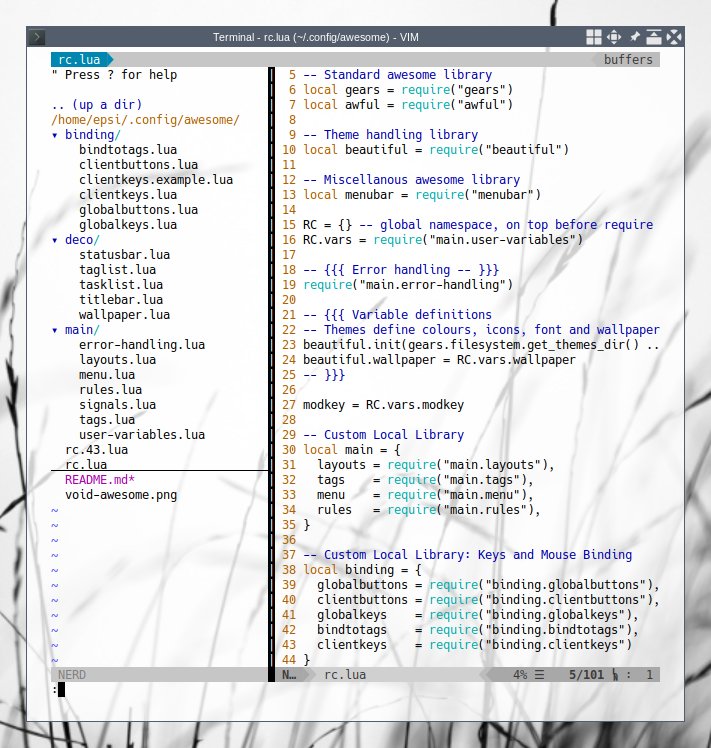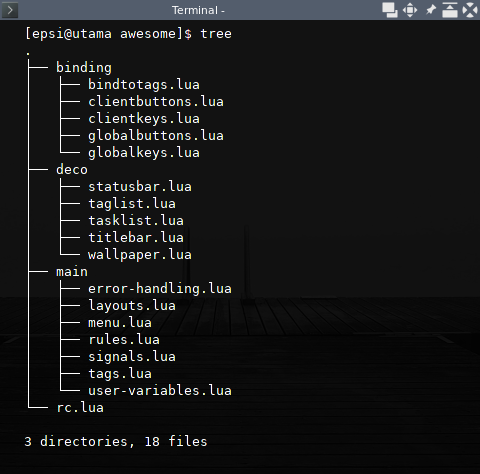Preface
Goal: Preparing modularized configuration by examining folder structure.
Table of Content
-
Preface: Table of Content
1: Config Comparation
As already said, Awesome configuration is long as 564 lines, as you can see in original provided configuration for 4.3 series below:
After modularized, the config would be, similar as 80 lines of code as below:
pcall(require, "luarocks.loader")
-- Standard awesome library
local gears = require("gears")
local awful = require("awful")
-- Theme handling library
local beautiful = require("beautiful")
-- Miscellanous awesome library
local menubar = require("menubar")
RC = {} -- global namespace, on top before require any modules
RC.vars = require("main.user-variables")
modkey = RC.vars.modkey
-- Error handling
require("main.error-handling")
-- Variable definitions
beautiful.init(gears.filesystem.get_themes_dir() .. "default/theme.lua")
beautiful.wallpaper = RC.vars.wallpaper
-- -- --
-- Calling All Module Libraries
-- Custom Local Library
local main = {
layouts = require("main.layouts"),
tags = require("main.tags"),
menu = require("main.menu"),
rules = require("main.rules"),
}
-- Custom Local Library: Keys and Mouse Binding
local binding = {
globalbuttons = require("binding.globalbuttons"),
clientbuttons = require("binding.clientbuttons"),
globalkeys = require("binding.globalkeys"),
bindtotags = require("binding.bindtotags"),
clientkeys = require("binding.clientkeys")
}
-- Layouts
RC.layouts = main.layouts()
-- Tags
RC.tags = main.tags()
-- Menu
RC.mainmenu = awful.menu({ items = main.menu() }) -- in globalkeys
RC.launcher = awful.widget.launcher(
{ image = beautiful.awesome_icon, menu = RC.mainmenu }
)
menubar.utils.terminal = RC.vars.terminal
-- Mouse and Key bindings
RC.globalkeys = binding.globalkeys()
RC.globalkeys = binding.bindtotags(RC.globalkeys)
-- Set root
root.buttons(binding.globalbuttons())
root.keys(RC.globalkeys)
-- Keyboard map indicator and switcher
mykeyboardlayout = awful.widget.keyboardlayout()
-- Statusbar: Wibar
require("deco.statusbar")
-- Rules
awful.rules.rules = main.rules(
binding.clientkeys(),
binding.clientbuttons()
)
-- Signals
require("main.signals")The main rc.lua,
should only contain skeleton of the configuration.

For you impatient folks out there,
here I represent, the modularized rc.lua,
along with the directory tree in figure above.
2: Directory Structure
Beside the main rc.lua,
all codes resides in these three folders:
-
main
-
bindings
-
deco
Of course you can use any folder name that suitable for you, and even use very different structure, other than provided in this article.
Update 2020

Directory Tree
I try not to make any customization at all, so that the structure should reflect, the original configuration provided by Awesome WM.
$ tree
.
├── binding
│ ├── bindtotags.lua
│ ├── clientbuttons.lua
│ ├── clientkeys.lua
│ ├── globalbuttons.lua
│ └── globalkeys.lua
├── deco
│ ├── statusbar.lua
│ ├── taglist.lua
│ ├── tasklist.lua
│ ├── titlebar.lua
│ └── wallpaper.lua
├── main
│ ├── error-handling.lua
│ ├── layouts.lua
│ ├── menu.lua
│ ├── rules.lua
│ ├── signals.lua
│ ├── tags.lua
│ └── user-variables.lua
└── rc.lua
3 directories, 18 files
This is the basic structure. Structure may grow as needed. There will be other structure, for Awesome WM customization, in other articles.
3: Passing Value from Module
Moving code can be easy, or though task, depend on each case. For most part there are only these two cases:
-
just cut-then-paste, and done
-
require using metatable, usually when returning values.
Module: Error Handling
Consider jump with an example.
Always remember to add required library
Moving code is just a matter of cut-then-paste,
from the main rc.lua,
to related module.
-- Notification library
local naughty = require("naughty")
-- -- -- -- -- -- -- -- -- -- -- -- -- -- -- -- -- -- -- -- -- -- -- --
-- Check if awesome encountered an error during startup and fell back to
-- another config (This code will only ever execute for the fallback config)
if awesome.startup_errors then
naughty.notify({
preset = naughty.config.presets.critical,
title = "Oops, there were errors during startup!",
text = awesome.startup_errors
})
end
-- Handle runtime errors after startup
do
local in_error = false
awesome.connect_signal("debug::error", function (err)
-- Make sure we don't go into an endless error loop
if in_error then return end
in_error = true
naughty.notify({
preset = naughty.config.presets.critical,
title = "Oops, an error happened!",
text = tostring(err)
})
in_error = false
end)
endThe only thing different is, you still have to add this.
-- Notification library
local naughty = require("naughty")Calling Module without Passing Value
In the main rc.lua,
you can call the module by either of using do:
local config_path = awful.util.getdir("config") .. "/"
-- Error handling
dofile(config_path .. "main/error-handling.lua")Or require:
-- Error handling
require("main.error-handling")I found that require is easier.
require also use dot (.),
so you do not need to worry about using slash in linux,
or backslash in windows.
This way is sufficient, since it doesn’t need any value to be returned, from this module
Module: User Variables
Returning value require different approach. Consider moving user variables into modules.
local home = os.getenv("HOME")
local _M = {
-- This is used later as the default terminal and editor to run.
terminal = "xfce4-terminal",
-- Default modkey.
modkey = "Mod4",
-- user defined wallpaper
--wallpaper = home .. "/Pictures/your-wallpaper-here.jpg",
}
return _MThis user variables module will grow as your code grown.
.
As you can see in above code, we need to return values from the module.
This would be easier by wrapping these values in local variable.
You can use any name that you like,
now consider name this internal variable as _M.
local _M = {
-- some setting here
}
return _MThis internal variables _M,
would not be used in main configuration.
These approach works for simple value passing, in fact most module here only need this approach.
Calling Module with Returning Value
In main configuration, we can call use require as usual.
vars = require("main.user-variables")
modkey = RC.vars.modkeyAnd later we can access inside value with
vars = require("main.user-variables")
modkey = vars.modkeyFor a reason, I do not want this configuration,
to be polluted by having too many variables.
So I wrapped them in one variable named RC.
And the final result is as below.
RC = {} -- global namespace, on top before require any modules
RC.vars = require("main.user-variables")
modkey = RC.vars.modkeyUsing Metatable
For complex situation, we need a better approach,
using metatable,
such as when a module contain some other function,
that should be called from main configuration.
We can rewrite code above using metatable.
local _M = {}
function _M.get ()
local variable_name = {
-- some setting here
}
return variable_name
end
return setmetatable(
{},
{ __call = function(_, ...) return _M.get(...) end }
).
This basic modularized modules does need any metatable,
but I use it anyway. For personal reason,
I need to be familiar with this metatable.
What is Next?
Consider continue reading [ Awesome WM - Main Modules ].
There are, some interesting topic,
about refactoringAwesome WM using Lua.
What do you think ?